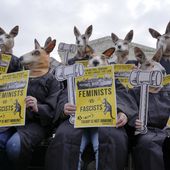Mitt Romney proposed doubling the size of Guantanamo Bay’s detention center, John McCain defended his teamwork with Democrats in the Senate, and Rudolph W. Giuliani angrily demanded a retraction from a fellow presidential candidate who said the September 11 bombings were a result of U.S. actions in Iraq.
The three top-tier Republican presidential hopefuls sparred with each other and fended off attacks in the primary season’s second debate from seven lower-tier candidates who charged the front-runners are not conservative enough on spending, immigration, tax cuts and abortion to lead the Republican Party.
“Conversions on guns, conversions on abortion, conversions on immigration. You know, it’s beginning to truly sound like a Baptist tent revival meeting here,” said Rep. Tom Tancredo, Colorado Republican and one of the challengers trying to gain ground on Mr. Romney, former governor of Massachusetts; Mr. McCain, a senator from Arizona; and Mr. Giuliani, the former mayor of New York.
Mr. Giuliani again found himself on the defensive about his liberal-leaning views on abortion, gun-control and homosexual rights, but said Republican voters should be making their judgments on other factors — namely, who can beat Sen. Hillary Rodham Clinton in the general election.
“This election in 2008 is going to make a very big difference in whether we go in that direction,” he said during debate held at the University of South Carolina. “Republicans should be united to make sure that what the liberal media is talking about — our inevitable defeat — doesn’t happen.”
He said his fiscal record as mayor, combined with his security credentials, make him the strongest candidate. He explained his pro-choice position as a stance people can disagree with but said there should be agreement on all sides to “look for ways to reduce abortions.”
While defending signing a gun-control law as governor, Mr. Romney took the offensive on the war on terrorism and defended harsh interrogation techniques to defend the country.
Mr. Romney said that instead of closing the detention center at Guantanamo Bay, Cuba, as both Mr. McCain and President Bush have proposed, “My view is we ought to double Guantanamo.”
He also challenged Mr. McCain’s partnership with Democrats Sen. Edward M. Kennedy on immigration and Sen. Russ Feingold on campaign-finance restrictions, saying on immigration in particular that Mr. McCain wants to create a new pathway to citizenship for illegal aliens.
Mr. McCain defended his actions as the cost of bipartisanship on major issues.
“I don’t intend to block things. I intend to get results, and I intend to work on the hard things, not the easy ones,” he said.
With the immigration debate beginning in the Senate, Mr. McCain tied himself to the current negotiations that likely will lead to a bill granting citizenship rights to most illegal aliens.
“What the American people expect us to do is to sit down and work this issue out together,” he said.
He also challenged Mr. Romney, who has reversed positions on abortion and other issues.
“I have kept a consistent position on right to life. And I haven’t changed my position on even-numbered years or have changed because of the different offices that I may be running for.”
Mr. Giuliani showed the most spunk of the night when he demanded Rep. Ron Paul retract his statement that the United States was attacked because it was involved in Iraq from the 1991 war.
“I don’t think I’ve heard that before, and I’ve heard some pretty absurd explanations for September 11th,” the former mayor said.
Mr. Paul, Texas Republican, stood firm, saying “blowback” to U.S. actions is real: “If we ignore that, we ignore that at our own risk. If we think that we can do what we want around the world and not incite hatred, then we have a problem.”
The best line of the night went to Arkansas Gov. Mike Huckabee, who said Washington politicians are wasting money.
“We’ve had a Congress that spent money like John Edwards at a beauty shop,” he said, referring to the campaign-finance reports that showed Democratic presidential candidate Mr. Edwards paid $400 for a haircut.
Meanwhile, Mr. Tancredo charged that some of the candidates on the stage last night voted for the No Child Left Behind education expansion and for the $400 billion Medicare overhaul in 2003.
“How in the world can they come back here and say we’ve got to be careful of spending?” he said.
Former Wisconsin Gov. Tommy Thompson seemed stumped when asked what three specific programs he would cut, while Mr. Paul embraced the question, saying he would “start with the departments” — the Education, Energy and Homeland Security departments.
Unlike the Democratic candidates, who are competing with each other to appear as the most opposed to Mr. Bush and the war in Iraq, almost all of the Republican contenders continued to support U.S. military efforts in Iraq.
But they found points of contention on who is best able to lead, with Rep. Duncan Hunter, California Republican, saying that as a former soldier in Vietnam and former chairman of the House Armed Services Committee with a son serving in Iraq, he has the ability to bring the country together behind the war effort.
“I think the other guys ought to lay out their credentials to be commander in chief,” he said.
Sen. Sam Brownback of Kansas and former Virginia Gov. James S. Gilmore III also participated in the debates.
Two Republicans who haven’t announced candidacies still loomed large over last night’s debate: former Tennessee Sen. Fred Thompson, whom many conservatives are begging to run for the Republican nomination, and current New York Mayor Michael R. Bloomberg, who The Washington Times reported yesterday is prepared to spend $1 billion on a third-party campaign.
The 90-minute debate was broadcast by Fox News.



Please read our comment policy before commenting.